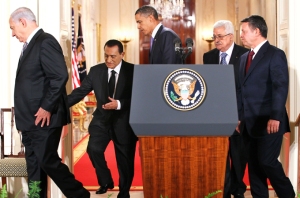A Fog of Myths About North Korea
April 29, 2013 at 1:59 pm | Posted in Arms Control, Capitalism, Human Rights, International Relations, Nuclear Non-Proliferation, Political Economy, World Politics | Leave a commentTags: China, East Asia, India, interstate system, Israel, Japan, North Korea, Pakistan, South Korea, the Philippines, United Nations, United States, US hegemony, Vietnam
Rarely has the manufacturing of consent in the mainstream media been as thorough as it has been in the case of North Korea. It is the original ‘hermit kingdom,’ isolated from the outside world by a dynasty of communist dictators–a ‘socialism in one family’–and irrational to the extent of threatening Washington with a nuclear Armageddon. This reigning consensus is so widespread that there has been little challenge to it in the major news outlets of the world and yet, a moment’s reflection suggests that there are many flaws in this narrative.
In the first instance, in a rare piece of insight into North Korea, a former Western intelligence officer who writes under the pseudonym of James Church has argued that since isolationism is a two-way street, the rest of the world is even more ignorant about North Korea than Pyongyang is about the wider world. After all, North Korean officials can monitor radio and television broadcasts, plug into the Internet, and analyse books and magazines from the outside world. They know what people outside their borders are thinking and doing. But people outside North Korea have little insight into what goes on in the country and are metaphorically reduced to examining the entrails of sacrificial animals to divine Pyongyang’s intentions.
Hence, Church writes, “We…have developed a fog of myths about them as a substitute for knowledge. These myths, handed down from administration to administration, are comforting in their long familiar ring, but make it difficult for us to avoid walking in circles. The North Koreans move nimbly through this fog” like small boats deftly weaving in and out between lumbering vessels.
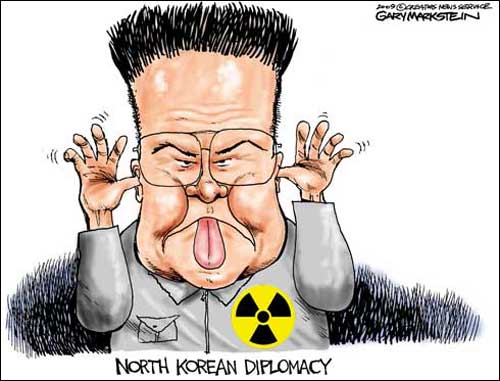
Rather than nuclear weapons, Church argues, North Korea’s greatest strength is the capacity to behave badly: by carefully choosing the right time, it knows its actions will force big powers to pay close attention even though they may grind their teeth. What it fears most is being swept aside in big power politics, so by playing its weak hand cleverly, it seeks dialogue with the United States, a process that was derailed when former president George W. Bush labelled it part of an “axis of evil.”
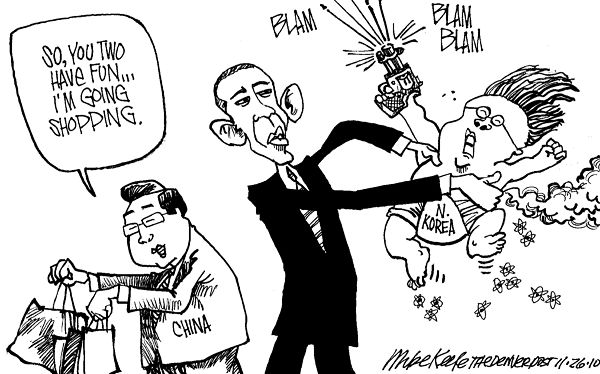
Recent concerns about Pyongyang’s nuclear program stemmed from an underground nuclear test on February 12, 2013—its third in seven years. In response, the United States and its allies pressed the UN Security Council to add new sanctions on the country: enhanced scrutiny over shipments and air cargo, a ban on the sale of luxury goods, expanded restrictions on a range of institutions and senior officials. China, notably, signed on to these sanctions and did not veto them.
If China is dragging its feet on the issue of North Korea, it is also because Beijing has a stake in the survival of the Kim Jong-eun regime. The collapse of North Korea could bring a stream of refugees to China which already has 2 million ethnic Koreans and threaten the stability of the border region. Moreover, since a unified Korea is likely to be led by Seoul, it raises the possibility of US forces on China’s border with Korea. A unified Korea with some 70 million people would also become a formidable economic competitor and transform the dynamics of the regional economy as Timothy Beardson writes in the Financial Times.
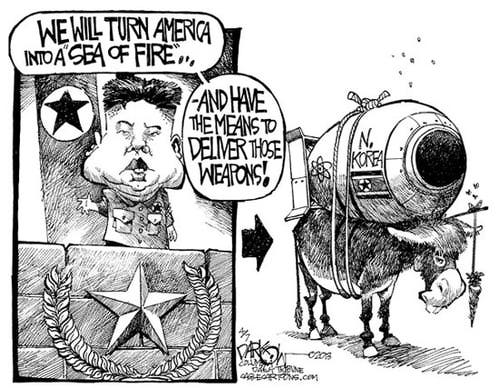
When President Barack Obama acknowledges that North Korea does not have a single deployable nuclear warhead, and according to SIPRI, the five permanent members of the Security Council—all declared nuclear powers—had approximately 19,265 as of January 1, 2012, this response to Pyongyang’s third nuclear test seems disproportionate. This is all the more so since North Korea has withdrawn from the nuclear Non-Proliferation Treaty and the other states outside the NPT—India, Israel, and Pakistan—are not treated in the same way as Pyongyang. As Jonathan Steele writes in the Guardian, “If it is offensive for North Korea to talk of launching a nuclear strike against the United States (a threat that is empty because the country has no system to deliver the few nuclear weapons it has), how is it less offensive for the US to warn Iran that it will be bombed if it fails to stop its nuclear research?”
In response, statements in the official newspaper of the ruling Workers’ Party of Korea (WPK), Rodong Simun, on March 6, 2013 declared that if the US continues to threaten it with nuclear weapons, Pyongyang now had the ability to turn Seoul and Washington into “a sea of fire.” North Korea also repudiated the 1953 Korean War ceasefire and cut the Red Cross hotline though lines between military and aviation authorities across the 38th parallel remain open.
Notably, till the middle of March, its foreign office maintained that it will abandon its nuclear weapons program if the United States removes its nuclear threats and abandons its hostile posture.
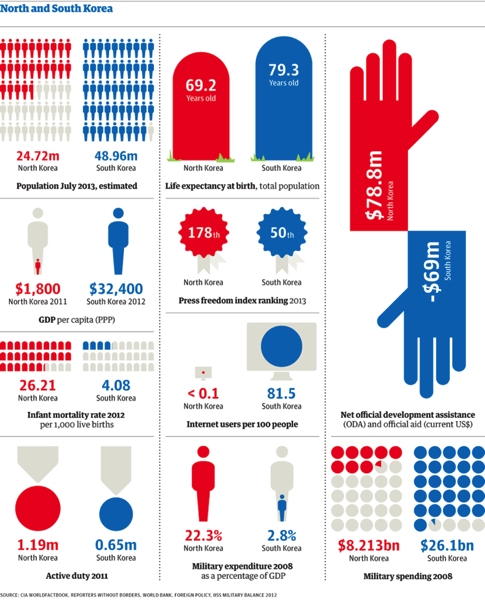
In reply, as Peter Hayes and Roger Cavazos of San Francisco’s Nautilus Institute note, on March 25 the United States flew B-52 Stratofortress stealth bombers over South Korea in military exercises that stimulated a nuclear attack on North Korea. Not only did these military exercises stir deep memories in North Korea where air raids killed an estimated 20 per cent of the population during the Korean War but the B-52 flights at the same time demonstrated China’s inability to affect US mobilization. The United States also bolstered its anti-missile batteries in Alaska and the West Coast.
Should it then surprise us that the North Korean ruling party’s Central Committee Plenum meeting set a ‘new strategic line’ of simultaneously pursuing the path of economic construction and “building nuclear armed forces”? It also announced that it would resume uranium enrichment at the Yongbyon reactor plant that had been moth-balled in October 2007 as a part of the denuclearization process.
Nevertheless, the WPK’s Central Committee Plenum ended by also declaring that “As a responsible nuclear weapons state, the DPRK [Democratic People’s Republic of Korea] will make positive efforts to prevent the nuclear proliferation, ensure peace and security in Asia and the rest of the world and realize the denuclearization of the world.”
In a state born of guerrilla struggle, leadership requires as Hayes and Cavazos suggest, endless battles and if Kim’s leadership itself is not under threat, he needs to embellish his own credentials. Hence, his belligerence is intended as a professor of Sociology at Seoul National University also suggests, as a manoeuvre to outflank the military while preparing the ground to initiate a more pragmatic economic policy. Thus amid the rattling of nuclear sabres, Kim has appointed as his premier, Pak Pong-ju a pragmatic economist who had been forced out of office in 2007 by the military, reportedly because he followed Chinese suggestions on economic reforms too closely.
North Korea does not have enough resources to build its economy and to maintain the world’s third largest conventional armed force. Unlike China when it started its reform process in the late 1970s, Pyongyang does not have a huge reserve labor force in agriculture. Its economy is sustained only by extensive food and oil imports from China. To successfully pursue economic growth, a nuclear deterrent will enable Kim to divert labor from his conventional military and hence the ‘new strategic line’ announced by the WPK’s Central Committee Plenum—to simultaneously work at both economic construction and ‘building nuclear armed forces.’
However, by promising not to export nuclear weapons or material, Kim signals that he has no intention of crossing red lines. Indeed, during the recent visit to North Korea by US basketball star Denis Rodman, Kim asked him to tell President Obama to phone him. The American president pointedly refused to accept this invitation in an interview with George Stephanopoulos.
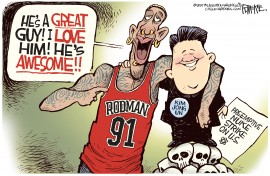
Again, in an unusual move, North Korea’s ambassador to the United Kingdom, Hyon Hak-bong addressed the Communist Party of Great Britain (Marxist-Leninist) and asserted that North Korea’s only interest was its legitimate self-defence. While North Korean ambassadors have attended meetings of fraternal associations in the past, it has usually been to accept messages of appreciation or praise—not usually to make statements. What better way to signal Pyongyang’s intentions to negotiate than for its ambassador to make a statement in a European capital?
All US Secretary of State, John Kerry, would offer in return was an offer to talk if North Korea offered unspecified concessions to show its good faith. Faced with US and South Korean intransigence, North Korea effectively closed the Kaesŏng Indusrial Park—a special industrial region—where 123 South Korean companies had been employing 53,000 North Korean workers and directly paying Pyongyang $90 million in wages every year. Significantly, while this is a serious loss to the Kim regime, it is also a non-military response to what the regime sees as persistent US provocation.
While the military was suspicious of Kaesŏng, viewing it as a Trojan horse, the regime’s decision to close it (perhaps temporarily) may indicate that it is trying to show that it is willing to bear a significant cost to send a message that it is serious in its stance.
This should be seen in the light of the fact that the government has turned a blind eye to the growth of a market activities in the country which, Andrei Lankov, a Russian specialist on Korea estimates provides 75 per cent of the income of the people outside the military and the upper echelons of the party. Frequent travel to China and the availability of DVDs about South Korea have opened their eyes to new possibilities offered by consumerism.
This makes it all the more important for the regime to compel its adversaries to change their policies, to secure a peace agreement, to denuclearize the peninsula, and to get reparations from the Japanese who colonized the country from 1895 to 1945. This has been the aim of the regime for 60 years but has assumed a new urgency. A peace treaty is a sign that Pyongyang needs to show that the United States and its friends that grotesquely masquerade as “the international community” accepts it as a legitimate state.
Afghanistan, Pakistan and the Intolerable US Arrogance
May 22, 2012 at 10:31 am | Posted in Arms Control, Human Rights, International Relations | Leave a commentTags: Afghanistan, Central Asia, Human Rights, international relations, interstate system, military, NATO, Pakistan, Russia, United States, US hegemony, US politics, world politics
By what arrogance does NATO invite a head of state to a meeting and then have the head of state of the host nation refuse the visiting dignitary a one-on-one meeting even as his rival is granted an audience and then expect the snubbed leader to obsequiously accede to all demands even as drone aircraft murders the leader’s citizens and even troops with impunity? Yet, this is what President Barack Obama did to Pakistan’s Asif Ali Zardari who was summoned to the NATO conclave in Chicago at the very last minute. When it became apparent that a mere invitation was not going to make him cave in, he was refused a meeting with the US President who nevertheless met with the Zardari’s rival, the Afghan president Hamid Karzai thus humiliating Zardari. When aides scrambled to get the two presidents to “accidentally bump” into each other at the meeting, Obama pointedly told a press conference that that was their only exchange.

Last November, a strike by a US drone aircraft killed 24 Pakistani soldiers. The United States has refused to apologize for the murders even though it has acknowledged that its drone aircraft was responsible for the deaths. Consider the situation. The US needs Pakistan as an ally–granted that it is a cantankerous and difficult one. Surely, the best way to further alienate its citizens is to indiscriminately kill them by drone planes controlled from bases deep inside the US. The victims have little warning of their impending death–and the controllers of the planes do not put themselves in harm’s way at all. This is blood sport for them without risk–and when innocent civilians or Pakistani soldiers, the very ones the US depends on to stop al-Qaeda and Taliban fighters, are killed, President Obama refuses to apologize!
Given rising anger in Pakistan, the government shut down two key supply routes for the NATO troops in Afghanistan, forcing the North Atlantic alliance to use more circuitous routes through Central Asia and Russia. Again, snubbing President Zardari, the US Secretary of Defense, Leon Panetta, lauded the help and support of Kazakhstan, the Kyrgyz Republic, Tajikistan, Turkmenistan, and Uzbekistan–pointedly ignoring Pakistan. It is true that Pakistan has demanded a 20-times hike of the transit fee for trucks–for $250 to $5000. But this could have been negotiated if an apology was forthcoming.

Without the supply routes from Pakistan, the withdrawal of equipment brought into Afghanistan for more than a decade will be immensely complicated and the chances of lethal weaponry falling into the hands of the Taliban, al-Qaeda, and other militant groups increases geometrically. It would be another nail in the coffin of the US-NATO failure in Afghanistan. After more than 10 years of war, it is unlikely that the Karzai government will survive even for the three years the Soviet supported regime survived before being toppled–and it was toppled not because the insurgents’ military successes but because Moscow stopped deliveries of arms, fuel, and other supplies. As Juan Garriges writes for the Barcelona Centre for International Affairs, the likelihood of a civil war after NATO leaves is steadily increasing.
As Jonathan Steele writes in the Guardian, unlike the Soviets, NATO is not negotiating with the Taliban but is pursuing a garrison strategy that is virtually guaranteed to fail:
Increasing numbers of Afghan troops will sit in bases and go out on patrols instead of US and British ones, but this is nothing more than “Nato with an Afghan face”. Locals see these Afghan troops as occupiers just like the US and British. Less than 4% of the Afghan National Army are southern Pashtuns. Most are Tajiks and Uzbeks who speak a different language and don’t know the area. But if you recruit more southerners in a hurry, you just feed the Taliban’s latest tactic: join the Afghan army and police, get trained by the Americans and British, then shoot them in the camp or mess hall.
In these conditions, to continue to snub Zardari and refuse to apologize for the killing of the soldiers–perhaps for domestic electoral purposes as Obama’s likely Republican opponent, Mitt Romney, will certainly exploit it–is almost to ensure that the Pakistani Inter-Services Intelligence directorate (ISI) will increase its interference in Afghanistan especially since there is little love lost between the Karzai administration and the Pakistani military and political establishment.
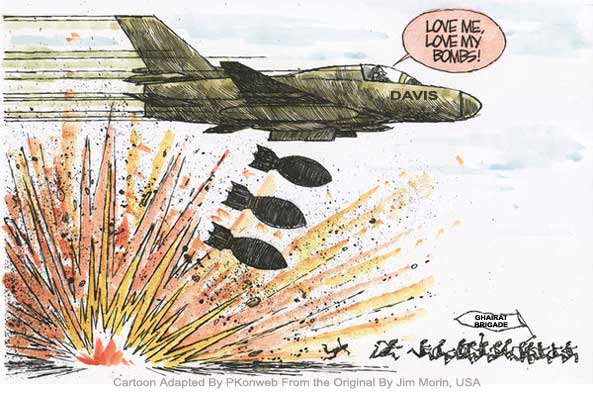
Finally, in NATO’s haste to cover its failure there is nary a word on the condition of Afghan women–sure to regress to the state they were in at the time of the 2001 invasion! The US-led invasion may have temporarily ousted the Taliban from Kabul and eventually killed Osama bin Laden in Abbottabad, but it has also devastated Afghanistan, killed tens (if not hundreds) of thousands of Afghans and thousands of Pakistanis, further destabilized Pakistan, fuelled the spread of al-Qaeda and other Islamic fundamentalists to Iraq, the Arabian peninsula, and east Africa, and expended trillions of dollars when the world-economy is mired in a crisis like no other since the Great Depression, and to the loss of thousands of American lives as well. Constitutional liberties have been suspended and torture has been reintroduced as a matter of state policy. The man who campaigned to change all this has done nothing at all!
Will Barack Obama be the first American president to invade Africa?
April 21, 2011 at 9:29 pm | Posted in Arms Control, democracy, Human Rights, International Relations, Political Economy, World Politics | 1 CommentTags: Africa, Belgium, Canada, Denmark, France, Global South, interstate system, intervention, Italy, Libya, Middle East, NATO, North Africa, Spain, United Kingdom, United States, US hegemony, US politics
One month into the bombing of Libya by NATO forces, if anything the situation is worse than before. After an initial assault, the United States withdrew to a supporting role but those of its NATO allies that chose to participate in the military attack against Colonel Muammer Gaddafi’s forces–mainly France and the UK, with some support from Spain, Denmark, Canada, and Belgium–have discovered that they do not have the military force required to roll back the Libyan government troops. Without anti-tank planes, they were unable to stop the pro-Gaddafi forces’ advance against the rebels in the east or to relieve the siege of Misurata. President Barack Obama has now authorized the use of US Predator drones and is gradually being drawn out of the supporting role he had sought. Will the NATO allies and the US have to commit ground troops to resolve the impossible situation they have got themselves into? Will Barack Obama go down in history as the first American president to invade an African state?
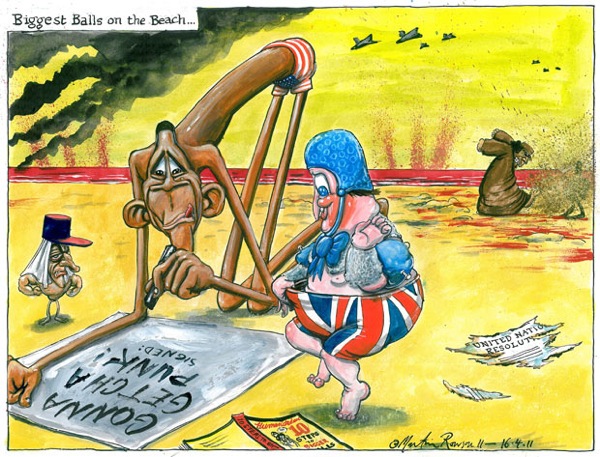
Despite the aerial bombardment of Colonel Gaddafi’s forces, the ragtag militia of the rebels do not have the training or the weaponry to withstand his forces which have now adapted measures to blunt the effectiveness of air raids–using human shields, riding in pickup trucks, using camouflage. About the rebels, a New York Times correspondent wrote:
… by almost all measures by which a military might be assessed, they are a hapless bunch. They have almost no communication equipment. There is no visible officer or noncommissioned officer corps. Their weapons are a mishmash of hastily acquired arms, which few of them know how to use.
Military chiefs on both sides of the Altantic had urged caution but France’s Nicholas Sarkozy to boost his domestic poll ratings and Britain’s David Cameron seeking some of the glory that Margaret Thatcher reaped from her victory over Argentina in the Malvinas conflict urged President Obama to support their ‘humanitarian intervention’ in Libya. Yet, there was never any clarity as to who the rebels were–as General Carter Ham, commander of the US Africa Command, told Congressional leaders and it appears that they represent coastal tribes of Cyrenaica while the tribes of the interior and the west continue their allegiance to Colonel Gaddafi.
Most notably, the objectives of the NATO mission in Libya are unclear or cannot be achieved merely by an air campaign. Its efforts have certainly postponed the defeat of the insurgents but without ground troops, it cannot oust the Colonel from power even though Sarkozy, Brown, and Obama have all called for his departure as the only acceptable solution. Note that this was not mandated by the UN Security Council resolution 1973 which sanctions the NATO operation and the resolution had explicitly forbidden ‘foreign occupation troops of any form.’ Yet, Britain, France, and Italy have all said they would send ‘unarmed military advisors‘–a prospect almost certain to involve deeper involvement: what would happen if these ‘unarmed’ advisors were targeted by the Libyan government forces as they surely are a legitimate military target?
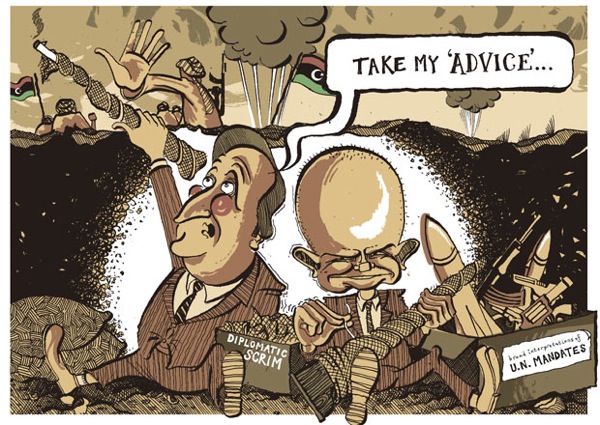
Insistence of the removal of Colonel Gaddafi from power rules out a negotiated settlement. A more likely prospect is that Libya will be partitioned into an eastern part which will effectively become a NATO protectorate with the bulk of Libya’s oil supplies. Neither France nor Britain has sufficient forces to keep pro-Gaddafi forces from attacking the Benghazi enclave–and it would require US boots on the ground–making the first African-American president of the US to be the first American president to invade and occupy an African state! After all, Khalifa Haftar who has been claiming to be the field commander of the rebel forces had been living near the CIA headquarters in Langley, Virginia for 20 years and they had provided him with a training camp.
The whole of Libya–east and west–would require massive reconstruction assistance given the damage done to its infrastructure by civil war and aerial bombardment. Who is going to fund this reconstruction? Is it ‘humanitarian to bomb the hell out of a country and then leave it in shambles? After all, the neo-conversatives claim that Iraq–which has far greater oil reserves–can pay for its own reconstruction remains hollow eight years after the US invasion.
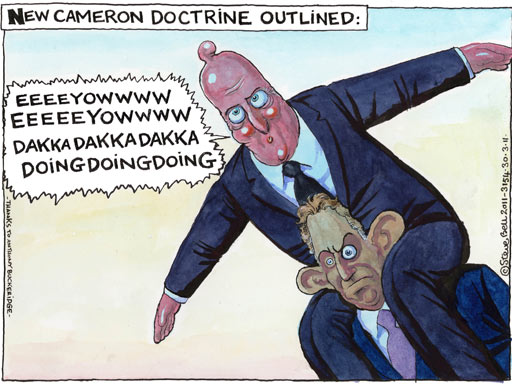
Even if the Gaddafi regime were to implode due to economic sanctions and the loss of the bulk of its oil revenues, his boast of arming every Libyan is likely to plunge the country into a prolonged phase of violent disruptions.
Iceland–An Independent People
April 20, 2011 at 2:49 pm | Posted in democracy, Free Trade, International Relations, Labor, Political Economy, World Politics | 2 CommentsTags: 21st Century Capitalism, Euro, European Union, financial crisis, Germany, Greece, Iceland, Internnational Monetary Fund, Ireland, Libya, NATO, neo-liberalism, Netherlands, Portugal, Spain, United Kingdom, US hegemony, US politics, World-economy
In the midst of the NATO campaign against Libya and the budget deal between Republicans and the Democrats in the US, a far more historically significant event appears to have fallen off the radar. On April 9, 2011, the people of Iceland voted for the second time to reject a government proposal for Iceland taxpayers to repay some €4 billion to the governments of Britain and the Netherlands which had compensated their domestic depositors in the collapsed online bank, Icesave. Initially, the British and Dutch governments had pressured the Iceland government to agree to repay them over fifteen years at a 5.5 percent annual interest–which was estimated to cost each household in the tiny island nation about €45,000 over the period. This was rejected by 91 percent of the voters in a referendum in March 2010. After subsequent negotiations, London and Amesterdam agreed to lower the interest to 3.2 percent and stretch the repayment period to 30 years between 2016 and 2046. The deal was accepted by a large majority of 44 in favor and 16 opposed in the Althingi, Iceland’s parliament, which also rejected a clause to submit the bill to another referendum. Nevertheless, as the President, Olafur Ragnar Grimsson, refused to sign the bill, it was automatically subject to a referendum wherein it was rejected by almost 60 percent of the voters.
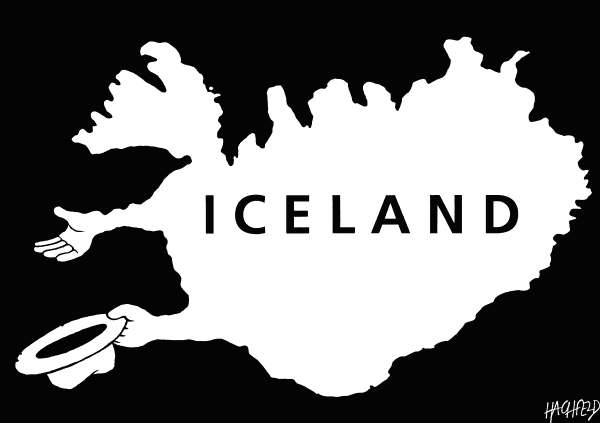
The Dutch and British governments–which had used anti-terrorist legislation to seize assets of the failed Icelandic banks–have threatened to scupper Iceland’s application to join the European Union and to take the island nation to court. Reykjavik has insisted that the two governments would get most of their money back and the assets of the Landsbanki bank which set up the Icesave operation would be sold and was expected to realize 90 percent of the Icesave debt. What was at issue in the referendum was not whether London and Amsterdam would be compensated or not–but whether private citizens should be expected to shoulder the burden of repayment of a bank’s debt in which they had no hand in incurring and from which they did not benefit. The threat to take Iceland to court is important because it is to frighten off other states which also face indebtedness due to the financial crisis like Greece, Ireland, and Portugal. It is simply the question of whether the bankers have to bear the burden of the bad loans they have extended.
Iceland is, in fact, a case study of neo-liberalism gone awry. Before the late 1990s, Iceland’s financial sector had been small and the banks were largely government-owned. In 1998, the two leading parties–the Independence Party and the Centre Party–embarked on a privatization of the banking sector, assigning Landsbanki to grandees of the Independence Party and Kaupthing to the Centre Party. A new private bank, Glitnir, was also set up merging several smaller banks. None of these banks had much experience in international finance, but like South Korean banks a decade earlier, these banks tapped into abundant cheap credit and easy capital mobility. Unlike the South Korean banks, their strong ties to political parties, the merger of commercial and investment banking, and low soveriegn debt meant that they got extremely high grades from the credit ratings agencies and as Robert Wade and Silla Sigurgeirsdottir note: “government policy was now subordinated to their ends.”
With the government relaxing mortgage rules to permit loans up to 90 percent of value, the banks rode the wave–by buying shares in each other they inflated share prices and enticed depositors to shift their savings to shares. In less than 10 years after the privatization of banks, Iceland had the fifth highest GDP in the world, 60 percent higher than that of the United States, and the assets of their banks was valued at 800 percent of Iceland’s GDP. As land prices soared, Icelanders loaded up on lower-interest yen- or Swiss-franc debt.
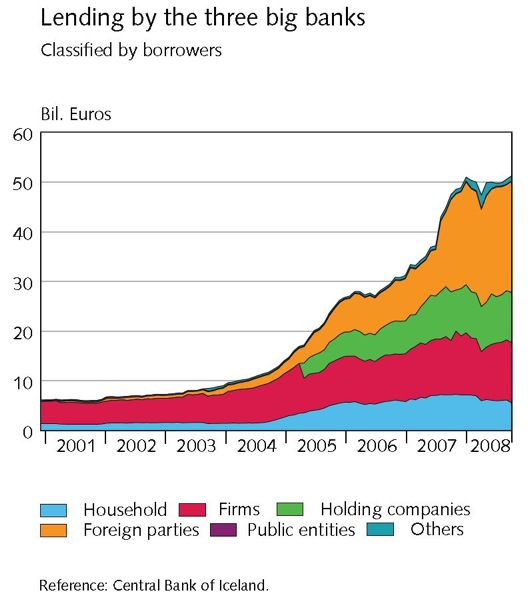
By 2006, Iceland’s current account deficit had soared to 20 percent of its GDP. Late in that year, Landsbanki established an online bank, Icesave, to attract deposits from overseas clients and by offering highly attractive interest rates, it raked in millions of pounds from England, and later millions of euros especially from the Netherlands. This was soon copied by the two other banks. These were established as ‘branches’ rather than as ‘subsidiaries‘ which meant that they were to be supervised by the icelandic Central Bank rather than regulators in Britain or the Netherlands. Because of Iceland’s obligations as a member of the European Economic Area to insure bank deposits, no one thought to worry about whether the Icelandic Central Bank had the capacity to oversee the vastly extended operations of the island’s three major banks.
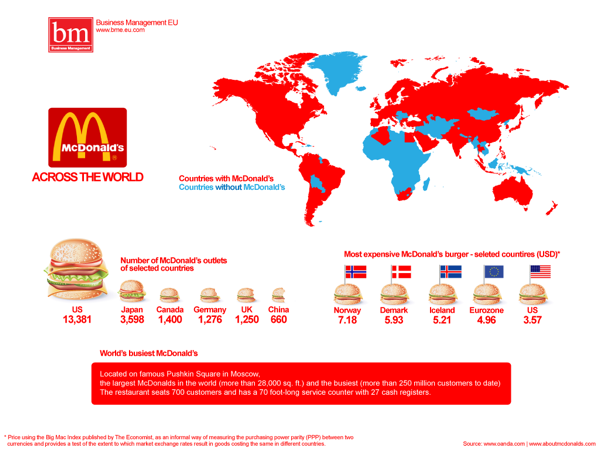
This happy bubble burst in September 2008 when Lehman Brothers collapsed, within a fortnight of which the three big Icelandic banks collapsed and by November of that year the krona had fallen from its pre-crisis level of 70 to the euro to 190 to the euro, so sharply cutting the islanders’ purchasing power that the three McDonald’s franchises were forced to close as the cost of importing ingredients made the price of burgers prohibitive! The country’s stock market lost 98 percent of its value! If ever there was a definition of crisis, this was it. It was the first time in over 30 years that a ‘developed’ state had to seek assistance from the International Monetary Fund.
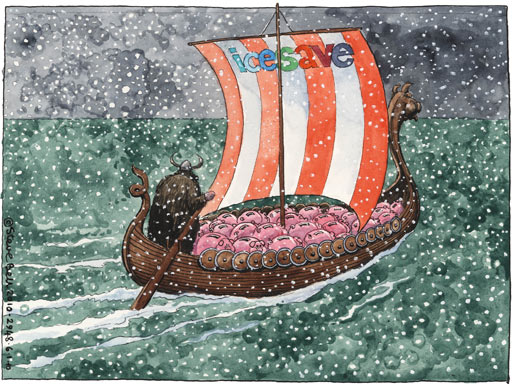
In the light of all this, Iceland’s voters have had the courage to face up to the crisis. It was the first country to kick out the government which had failed so spectacularly. Unlike its neighbor in the North Atlantic–Ireland which underwrote its own banking collapse and loader every household with €80,000 in debt–Iceland let the three banks go under and they imposed capital controls to prevent the flight of capital. Though unemployment in Iceland today is 7.5 percent in Iceland–up from 2 percent in 2002–but just over half of Ireland’s 13.6 percent. Though the krona lost almost half its value, inflation is down sharply and without having to pay back foreign creditors, its government finances are in much better shape than those of Greece, Ireland, or Portugal.
Libya and the Politics of Intervention
March 28, 2011 at 10:17 pm | Posted in Arms Control, Human Rights, International Relations, Nuclear Non-Proliferation, World Politics | 2 CommentsTags: Afghanistan, Africa, African Union, Bahrain, Brazil, Canada, China, Denmark, France, Germany, Global South, Holland, interstate system, Israel, Libya, Middle East, NATO, North Africa, Norway, Palestine, Persian Gulf, Russia, Spain, Uganda, United Kingdom, United States, US hegemony, Yemen
US-led attacks appear to have turned the tide against Colonel Muammer Gaddafi’s counter-revolution in Libya. Attacks by some 120 Tomahawk cruise missiles–each costing $575,000–and some eight days of air raids have established a ‘no-fly zone’ over Libya and US, French, British, Danish, Canadian, and other air forces have also targeted the Libyan government’s ground forces to deadly effect. The Libyan rebels, who had been virtually encircled in Benghazi have, as a result been able to roll back the government forces from Brega, Ras Lanuf, Ajdabiyia, and other towns in the east and are now attacking the town of Sirte, Gaddafi’s birth place.
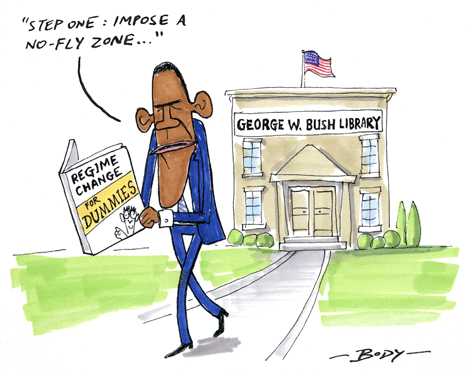
How are we to react to this exercise of Western military might against a state of the Global South? People like Gilbert Achcar and Juan Cole have vigorously defended the intervention in Libya. To them, the alternative would have been a brutal massacre of Gaddafi’s opponents by the better trained and equipped militias of the regime. For them, there were no other countervailing forces capable of intervening–not the African Union or Arab States. Western intervention was the only available option to stop a murderous dictator. It was sanctioned by the Arab League and the rebels themselves had pleaded for a ‘no-fly’ zone–a plea from a popular movement that could not be ignored. This was, a humanitarian intervention and not an attempt to secure access to Libya’s oil resources. After all, as Achcar points out, virtually all Western countries had oil companies operating in Libya already: “Italy’s ENI, Germany’s Wintershall, Britain’s BP, France’s Total and GDF Suez, US companies ConocoPhillips, Hess, and Occidental, British-Dutch Shell, Spain’s Repsol, Canada’s Suncor, Norway’s Statoil.”
There is of course the obvious objection: the West applies double standards, not only to Israel’s murderous assault on the Palestinians in Gaza but also to the brutal repression of protest movements in Bahrain and Yemen. As Richard Falk puts it:
How is this Libyan response different in character than the tactics relied upon by the regimes in Yemen and Bahrain, and in the face of far less of a threat to the status quo, and even that taking the form of political resistance, not military action. In Libya the opposition forces were relying almost from the outset on heavy weapons, while elsewhere in the region the people were in the streets in massive numbers, and mostly with no weapons, and in a few instances, with very primitive ones (stones, simple guns) that were used in retaliation for regime violence.
Indeed, almost from the very beginning of the protests, the rebels had taken arms and before Colonel Gaddafi’s forces launched a counter-assault, ragtag rebel militias had taken towns militarily from the regime’s gendarmes. Claiming that the regime was using African mercenaries, the rebels targeted anyone who looked “African’ including members of Libya’s African tribes because it is both an African and an Arab state.
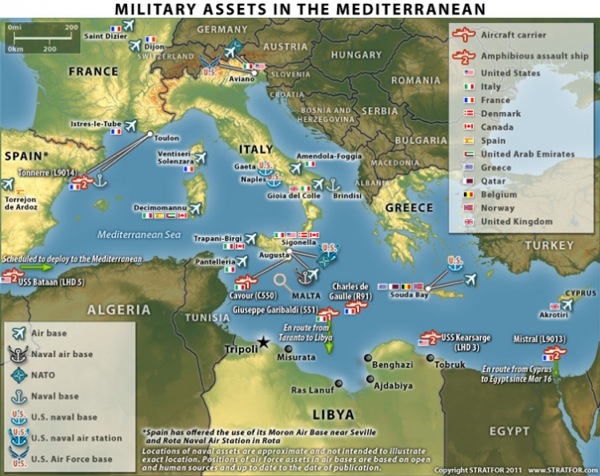
Analogies are often drawn to the situation in Rwanda but as the allusion to the African tribes in Libya suggests, no binary ethnic divide exists in Libya. There are many tribes and the confrontation between the regime and its opposition does not fracture along a single overriding ethnic divide and there is no genocidal intent in what is essentially a civil war between the regime and its opponents.
The character of the opposition also remains ambiguous–they include former members of the regime, local notables, radical Islamists, and eastern tribes opposed to western tribes. This was not the democratic movement that had swept autocrats from office in Tunisia and Egypt. The Arab League and the Gulf Cooperation Council may have supported the imposition of ‘no-fly’ zone but they do not speak for the Arab street and many of their members–Bahrain, Yemen–are actively engaged in brutally repressing democracy movements in their own states, and Saudi Arabia and other members of the Gulf Cooperation Council have intervened in Bahrain to help the al-Khalifa family crush its opponents.
The United Nations Security Council authorized the intervention–but only because the five members who abstained (Russia, China, India, Brazil, Germany) did not exercise their responsibilities. If they did not have enough information as the Indian delegate said–they should have abstained. The Russian Foreign Minister has subsequently said that the US-led air raids have far exceeded the Security Council’s authorization: this had been also raised by Amr Moussa, the Secretary General of the Arab League before he was pressured to retract his words.
Moreover, since Gaddafi has paid off many tribes, especially in the west, with oil revenues over the last 40 years, he has a solid core of support. What happens when the rebel forces attacks these population centers? Does the Security Council resolution to ‘protect the civilians’ not apply to them?
As also mentioned in an earlier post, if the regime follows through on its promise to arm its supporters, it could lead to a prolonged period of civil strife if Gaddafi is ousted as remnants of his supports could mount an armed resistance. This could lead to a new flow of African asylum-seekers to Europe. After all, as Achcar notes, a deal struck between Italy’s Silvio Berlusconi and Gaddafi reduced the flow of asylum-seekers to Italy from 36,000 in 2008 to a mere 4,300 in 2010. A prolonged stalemate or civil war in Libya, moreover as Vijay Prashad has written would constrain the West’s “ability to transit the oil that sits under its soil, and so dangerously harm the “way of life” of those who matter. Events had to be hastened.”
Intervention in Libya also raises a question: if Gaddafi had not abandoned his nuclear program in 2003, would the West have intervened in its civil war. Even though Gaddafi had sided with Idi Amin, President Yoweri Museveni of Uganda harshly criticizes “by now habit of the Western countries over-using their superiority in technology to impose war on less developed societies without impeachable logic. This will be the igniting of an arms race in the world.”
Finally, to the argument that there was no alternative to Western intervention in preventing a blood bath, the African Union had created an ad hoc commission to negotiate between the Libyan regime and its opponents but it was not allowed to begin its work on account of the air strikes and missile launches.
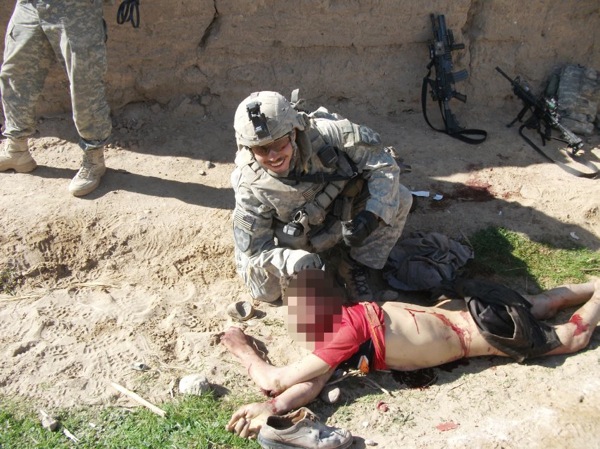
It is also perhaps worth wondering whether the United States which had been opposed to the French and British clamor for intervention, suddenly changed its mind just as Der Spiegel published photographs of grinning American troops posing with Afghan corpses–an event that got scant coverage in the event of the war against Libya. Otherwise, it may have got as much coverage as the atrocities in the Abu Gharib prison in Iraq. So much for humanitarian intervention!
Western Imperialism, Libya, and the Arab Revolts
March 22, 2011 at 3:42 am | Posted in democracy, International Relations, World Politics | 3 CommentsTags: France, Global South, India, international relations, interstate system, intervention, Iran, Iraq, Kosovo, Libya, Middle East, North Africa, Persian Gulf, Qatar, Serbia, United Arab Emirates, United Kingdom, United States, US hegemony
The United States and some of its European allies have once again launched an attack against a state in the Global South–this time as a humanitarian intervention to prevent Colonel Muammar Gaddafi from ‘slaughtering’ his opponents in Libya, and backed by a United Nations Security Council resolution and a resolution by the League of Arab States. Strikingly, none of the combatant governments–the United States, Britain, France, or the lesser European powers–sought legislative approval for before launching missiles and war planes against Libya. For an assault against a third-rate military power, it seems such democratic niceties need not be observed.
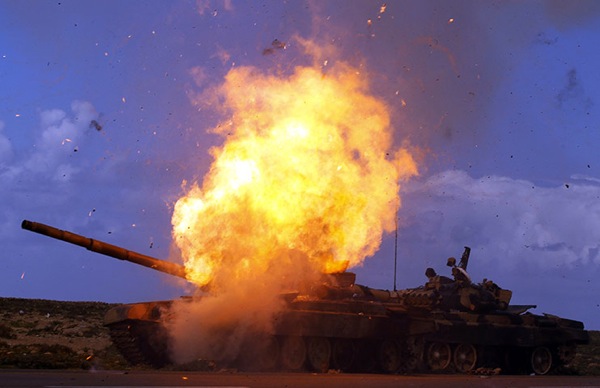
Even if it was a foregone conclusion that their national legislatures would have supported the assault against Colonel Gaddafi’s forces–as the British House of Commons did by a lopsided margin–this was largely due to a blanketing of other options in the mainstream media which made no mention of the ad hoc commission established by the Peace and Security Council of the African Union to mediate between the Colonel and his opponents. Equally importantly, in the absence of a detailed debate, there has been little planning on what would happen were a stalemate to develop–a possibility that Admiral Mike Mullen, the Chairman of the US Joint Chiefs of Staff admitted was a real possibility–or in a post-Gaddafi Libya
Indeed, this is hardly a war against Libya. The superiority of the United States in the air is so overwhelming that as Tom Englehardt has noted there is no element of danger for the pilots of US planes who last faced a serious threat in Vietnam in the early 1970s. The Serbian air force did not even bother to take to the air in the war over Kosovo, and in the First Gulf War, the powerful Iraqi air force flew most of its planes to Iran rather than engage with the US-led forces. For American pilots it is as safe to bomb another country as it is to pilot drones over Afghanistan from the Creech Air Force base in Nevada where “those leaving [the base] pass that warns them to “drive carefully” as this is “the most dangerous part of your day”!
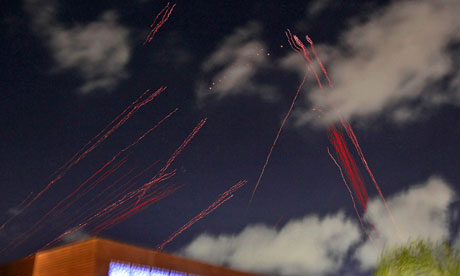
With the absence of any danger to US pilots, this resembles colonial wars where well-armed European troops mowed down with their repeater rifles hordes of native warriors armed only with spears and bows and arrows. Once American planes have taken out all Libyan air defense systems, British and French planes will enforce a no-fly zone, again at no risk to themselves. Underlining the suspension of the ordinary calculus of war, President Barack Obama embarked on his previously scheduled tour of three South American states even as his planes and missiles were pounding Libya.
For NIcolas Sarkozy of France, after the right wing Front National led by Marine Le Pen made historic gains in the first round of municipal elections, an image as a ‘war President‘ may just be the thing to propel him to victory in next year’s presidential elections–damn the consequences for Libyans, in true imperialist tradition!
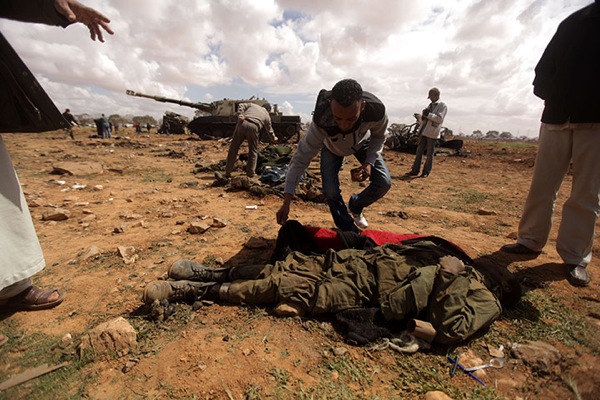 But the sheer ferocity of the assault is causing anguish even among those who initially called for the imposition of a no-fly zone. Though the League of Arab States had called for the imposition of a no-fly zone, images of the carnage wrought by missiles and bombs led its Secretary-General Amr Moussa to say after the second day of air strikes: “what is happening in Libya differs from the aim of imposing a no-fly zone, and what we want is the protection of civilians and not the bombardment of more civilians.” Intense pressure however made him back-track, despite widespread revulsion in the Arab world at the carnage sustained by Libyan civilians. Nevertheless, only two small states–Qatar and the United Arab Emirates–among the 22-member states of the League have agreed to take part in war effort. Russia and China which abstained from the Security Council vote have voiced concerns about the attacks and India, which also abstained from the Security Council resolution, became the first country to call for a cessation of air strikes.
But the sheer ferocity of the assault is causing anguish even among those who initially called for the imposition of a no-fly zone. Though the League of Arab States had called for the imposition of a no-fly zone, images of the carnage wrought by missiles and bombs led its Secretary-General Amr Moussa to say after the second day of air strikes: “what is happening in Libya differs from the aim of imposing a no-fly zone, and what we want is the protection of civilians and not the bombardment of more civilians.” Intense pressure however made him back-track, despite widespread revulsion in the Arab world at the carnage sustained by Libyan civilians. Nevertheless, only two small states–Qatar and the United Arab Emirates–among the 22-member states of the League have agreed to take part in war effort. Russia and China which abstained from the Security Council vote have voiced concerns about the attacks and India, which also abstained from the Security Council resolution, became the first country to call for a cessation of air strikes.
The role of the League of Arab States also appears compromised. First, Robert Fisk reported that Washington had asked Saudi Arabia to furnish arms to the rebels in Benghazi to which King Abdullah, facing his own problems, had failed to respond even though he loathes the Libyan leader who had tried to have him assassinated just over a year ago. Then the Wall Street Journal reported that with Washington’s encouragement and knowledge, the Egyptian military had begun to slip arms to the rebels. This raises the question of whether the post-Mubarak regime is going to play the role of another Western puppet–indeed Amr Moussa sudden back-tracking of his condemnation of the killings of civilians in the Western air raids gives no assurance of an independent regime emerging from the ashes of Mubarak’s autocracy. Indeed, it may well be that as Ali Abunimah wrote in the Electronic Intifada: “The greatest danger to the Egyptian revolution and the prospects for a free and independent Egypt emanates not from the baltagiyya–the mercenaries and thugs the regime sent to beat, stone, stab, shoot and kill protestors in Cairo, Alexandria and other cities– but from Washington.”
Many of the commentators who support the assault against forces loyal to Colonel Gaddafi suggest, even if grudgingly, that only the Western powers have the means to stop his slaughter of his opponents. This is not only to conveniently forget that the Colonel has ruled Libya with an iron hand but also that after he agreed to give up his weapons of mass destruction and join the war on terror, Western powers cosied up to him for lucrartive arms and oil contracts.
It is also to ignore that the African Union had opposed military intervention in the Libyan conflict and that the AU’s own ad hoc commission which Colonel Gaddafi had agreed to meet was not permitted to work as Western military intervention effectively ruled out a peaceful resolution of the conflict.
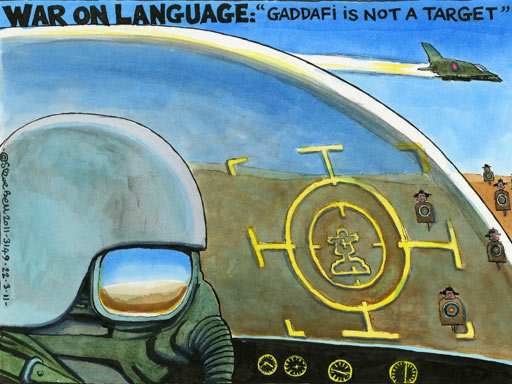
Most importantly, there appears to be no clarity on the goals of the air attacks on Libya. The British and American military leaderships claim that the removal of Colonel Gaddafi is not the aim of the air strikes–and indeed not within the scope of the Security Council resolution–but their political leaderships assert that regime change is indeed the goal. Responding to the attacks, the Libyan regime has said that it would arm civilians to fight against ‘crusader colonialists’–this could lead to a prolonged conflict were the regime to be deposed as what is left of his forces and supporters launch a bloody civil war. A civil war on the footsteps of Europe could lead to a flood of refugees and may well pave the way to occupation. Alternatively, in the case of a stalemate, Benghazi and eastern Libya may turn into a Western protectorate.
No-fly zones, Libya and the Arab Revolt
March 17, 2011 at 8:26 pm | Posted in democracy, Human Rights, International Relations, World Politics | 2 CommentsTags: African Union, Arab League, Bahrain, Brazil, China, Democratic Republic of Congo, France, Germany, India, interstate system, intervention, Iran, Iraq, Jordan, Kuwait, Mauritania, Middle East, NATO, North Africa, Oman, Palestine, Russia, Saudi Arabia, South Africa, Uganda, United Arab Emirates, United Kingdom, United States, US hegemony, Yemen
The United Nations Security Council–with the abstention of Russia, China, Germany, India, and Brazil–has done what military analysts have said would be folly: it has voted to impose a ‘no-fly zone’ on Libya and ‘take all necessary action’ short of ‘a foreign occupation force of any form’ to force Colonel Muammar Gaddafi out of power. ‘All necessary action’ could involve a ‘no-drive zone’ to cripple the Libyan regime’s armored vehicles from attacking Benghazi, Misrata, Tobruk, and other remaining rebel strongholds as well as sending in military advisers.
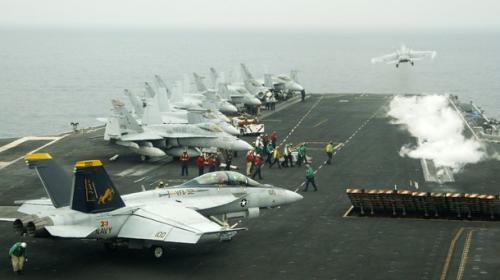
Advocates of the resolution have evoked humanitarian reasons–chiefly the regime’s brutal counter-assault using its air force and paramilitary forces to roll back the rebels–for intervention. This is buttressed by the belief that Libya is not even a third-rate power and its defenses can easily be destroyed. And the rebels are clothed in the accoutrements of democracy though the only thing that unifies the rebels is their opposition to the Gaddafi regime and it is not clear what a post-Gaddafi Libya will look like or even whether it will remain unified.
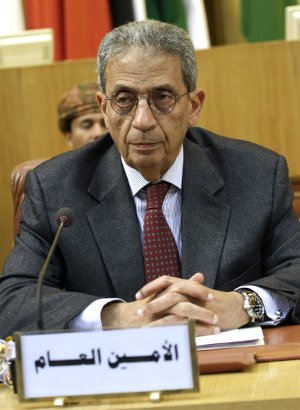
If humanitarian reasons are the chief justification, then it is clear that there is a double standard that is applied. Much has been made of the Arab League’s call for the imposition of a no-fly zone over Libya, but there has been no report of the fact that it was opposed by both Syria and Algeria. The states in support of the resolution–Saudi Arabia, Bahrain, Kuwait, the United Arab Emirates, Jordan, Oman, and Yemen–are hardly paragons of democracy. The governments of Yemen and Bahrain have brutally crushed demonstrations in their own countries; and Saudi Arabia and four other Gulf Cooperation Council states have sent more than 2000 troops to Bahrain to help the regime stay in power! Saudi Arabia has moreover prohibited protests in its eastern province, declaring such protests “illegal and un-Islamic”–and Saudi Arabia has more than 8,000 political prisoners!
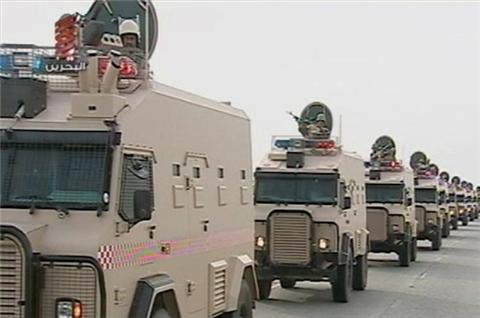
More importantly, there has been virtually no report in mainstream media in the West, that the African Union has condemned attempts to impose a no-fly zone on Libya. The AU’s 15-member peace and security council resolved, to “reaffirm[s] its firm commitment to the respect of the unity and territorial integrity of Libya, as well as its rejection of any form of foreign intervention in Libya.” It formed an ad hoc committee composed of South Africa, Mauritania, Uganda, and the Democratic Republic of Congo to engage in dialogue with all parties in Libya for a speedy resolution of the crisis.
There is no certainty that the military operation will be a smooth and easy one. Less than a month ago, US Secretary of Defense, Robert Gates, had told cadets at West Point that any secretary of defense who advises a president to intervene militarily in Asia or Africa ought to have his head examined. Admiral Mike Mullen, the Chairman of the US Joint Chiefs of Staff, has said that even the imposition of a ‘no-fly zone’ let alone all the other ‘necessary actions’ voted on by the Security Council will be “an extraordinarily complex operation to set up”–and of course, the major burden will be on the United States which is already engaged in two wars. British Prime Minister David Cameron may have led the charge for a ‘no-fly zone’ but Britain does not even have an aircraft carrier! General Wesley Clark, who commanded NATO forces in Kosovo, has argued that intervention in Libya does not meet critical tests: it is not in US national interest, the purpose of intervention is not clear, political prospects were Gaddafi to be ousted is unclear.
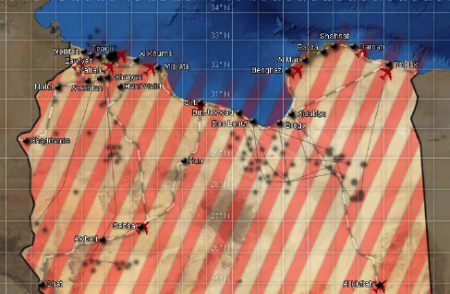
A ‘no-fly zone’ moreover, might have had a chance of success ten days ago when the Gaddafi regime launched its counter-assault. Now with the rebels in full retreat, and the regime ascendant–with the regime poised to assault the rebel capital of Benghazi–it is not clear whether a no-fly zone alone will suffice. A ‘no-drive zone’ is an even more ‘complex operation’ and increases the odds of British, American, and French casualties–Germany has refused to contribute troops to a NATO operation against Libya and Turkey is unlikely to participate as well. Colonel Gaddafi has promised to take the battle into the Mediterranean and that increases the prospects of Western civilian casualties and an escalation of the war. It will be a war Gaddafi may well lose, but it is not likely that NATO can extricate itself easily–and remember there is no international sanction for a foreign occupation force ‘of any form’ in the Security Council resolution!
If intervention is to promote democracy, George Monbiot notes that the Economist Intelligence Unit ranks Libya 158th of 167 countries on its Democracy Index while Saudi Arabia is ranked 160th–and in Libya “women are not officially treated as lepers were in medieval Europe.”
Here, the double standard is all too obvious. Saudi Arabia in the only remaining “swing producer”–the only oil-producing nation with enough excess capacity to raise production if supplies fall short of demand. But US diplomatic cables released by Wikileaks suspect that Saudi claims of reserves are exaggerated by almost 40 percent.
The Arab Revolt is not really about democracy–elections have not delivered results in the past, and when election results have angered the United States as in the Hamas triumph in Palestine, the US has condemned the results and applauded Israel’s punitive punishment of Gaza. The protests are about a wholesale change–not merely a change of rulers–because where there is a legal opposition, the opposition is often equally discredited.
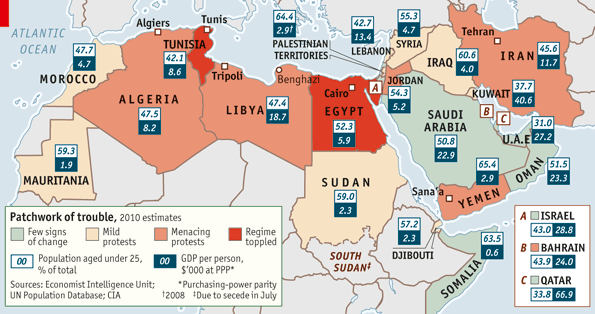
Key to the revolt has been an explosion of information–not only through al-Jazeera, but also through the Internet, travel, and TV–and the enormous growth of people aged below 25 to levels unmatched almost anywhere else. The youth exposed to a wider range of information and experiences have greater aspirations–and now that two of the tyrants have been ousted, the sense of empowerment is raised as Brian Whittaker notes.
It is this sense of empowerment that will take a beating if Western forces occupy Libya for a long while. It will signal pro-Western governments in the Persian Gulf–Saudi Arabia and the other oil-rich sheikdoms that they can count on mealy-mouthed appeals for restraint from Washington, London, and Paris as they crush their domestic oppositions. Ironically, this may play well in Iran’s favor. The Islamic Republic is very careful not to portray the conflicts in a sectarian light: if it can portray it as an attack on Muslims, and when Saudi Arabia, the Custodian of Holy Places, sends its troops to slaughter other Muslims, Iran raised the issue not with the Arab League but with the Organization of Islamic Conference. The Iranian Foreign Minister asked the Conference: “How can one accept that a government has proceeded to invite foreign military forces for the crackdown of its own citizens?” Tehran will gain even more credibility with the Arab forces when American, British, and French forces intervene in Libya.
Gaddafi’s Counter-revolution
March 13, 2011 at 3:41 pm | Posted in Human Rights, International Relations, World Politics | Leave a commentTags: Bahrain, Egypt, European Union, France, interstate system, intervention, Libya, Middle East, NATO, North Africa, Oman, Tunisia, United Kingdom, US hegemony, Yemen
If the revolt in Libya initially followed the script in Tunisia and Egypt, with protestors calling for democracy and the ouster of an autocrat who had ruled over them for long, it was quickly evident that the Libyan story would have its own murderous twists. Colonel Muammar al-Gaddafi had after all supported to the end his fellow autocrats–Tunisia’s Ben Ali and Egypt’s Hosni Mubarak–and urged them to retain their presidencies ‘life.’ And as he had centralized all power and deliberately kept the army weak, there were no generals who could send him packing. It was clear that he was not going to go timidly.
After an initial period of paralysis, when the rebels quickly consolidated their control over the oil-rich eastern parts of the country and began advancing to towards the regime strongholds of Sirte and Tripoli, Gaddafi launched a murderous counter-assault with tanks, heavy artillery, and air planes. The paramilitary forces commanded by his sons were far better equipped that the rebels and the military deserters who had joined them and have been steadily rolling back the rebels. Stopping the rebel advance in Bin Jawad, a small town between the oil refinery port of Ras Lanuf and Gaddafi’s home town of Sirte. The regime’s forces have now captured the ports of Ras Lanuf and Brega and are advancing towards the rebel headquarters of Benghazi, though Misurata in central Libya still appears to be holding out despite assaults by the pro-Gaddafi forces.
After having swiftly called for Gaddafi to go, the United States and West European leaders are now in a quandary. In the first instance, it is not clear whether President Barack Obama gets it at all: on March 4, he told Florida Democrats in Miami:
“All the forces that we’re seeing at work in Egypt are forces that naturally should be aligned with us, should be aligned with Israel — if we make good decisions now and we understand sort of the sweep of history.”
The fact that demonstrators across North Africa and the Persian Gulf are not chanting anti-Israel or anti-US slogans merely shows that the protests are rooted in domestic conditions, not that they are pro-Israel. Indeed, the demand for accountable governments is a demand for governments not to be subserviently enforcing Israeli policies as Mubarak had done!
When the British Prime Minister David Cameron initially called for a no-fly zone, and other Western leaders called on Gaddafi to go, it was expected to increase pressure on him to follow Ben Ali and Mubarak and leave quietly. And as the Libyan rebels were rolling from the east towards Tripoli everyone was keen to ensure that this was a Libyan revolution, one without foreign assistance. But the regime’s counter-assualt has changed all this. Now the rebels, the Benghazi-based Libyan National Council, recognized by France as the legitimate government of the country is calling for the imposition of a no-fly zone, a call endorsed by the Gulf Cooperation Council and the League of Arab States. On March 11, the European Union also said it would keep military action as an option “provided there is demonstrable need, a clear legal basis and support from the region.”
If the purpose of intervention–even the imposition of a ‘no-fly zone’–is to protect civilians, it reeks of double-standards. Not only have the United States, European leaders, or the Arab League not reacted in a similar manner to the killing of protesters elsewhere–in Yemen, Bahrain, Saudi Arabia, not to speak of Palestinians in the Occupied Territories–but members of the Gulf Cooperation Council and the Arab League are themselves guilty of killing protesters. At the time of writing, Yemeni forces are killing protesters in Sana’a and wounding hundreds elsewhere in the country.
While the imposition of a no-fly zone–an act of war and would imply at the very least the bombing of Libyan anti-aircraft defenses–may prevent Gaddafi from launching air raids, Anthony Cordesman, a defense expert at the Center for Strategic and International Studies, believes it will not severely dampen the regime’s counter-assault. It will do nothing to its heavy artillery and its trained paramilitary forces.

Arming the rebels poses problems of another order. The Libyan National Council is headed by Mustafa Abdul Jalil, a former Justice Minister in the Gaddafi regime but the names and identities of many of its members have not been revealed. They appear to be united only in their opposition to Gaddafi and include the entire spectrum from Islamic fundamentalists to pro-democracy activists and workers and the relative balance between these factions is anything but clear. What is clear is that the rebels have little or no military training and hence it is anything but certain that they can withstand the regime’s counter-assault even if they were provided with arms.
It is also clear that Gaddafi has a powerful constituency, bought off with his oil revenues and tribal loyalties. This inevitably implies that effective intervention on the terms being discussed by the European Union, NATO, and the United States would involve putting US and European forces on the ground. it is not clear how the US can sustain a third war in difficult financial circumstances and the intervention may strengthen Gaddafi’s hands if the Libyans see “French and English speaking troops conducting Iraq War style raids into their homes” as Vijay Prashad has rightly suggested. And any intervention coming on the heels of the US House of Representatives’ Homeland Security Committee hearings on the radicalization of American Muslims will be doubly egregious.
Indeed, the autocrats represented in the Arab League and the Gulf Cooperation Council may well have called for the imposition of a no-fly zone to divert attention from the domestic problems fueling the protests back to anti-imperialism!
What is additionally noteworthy is that the military government in Egypt has not taken a strong stand against the assault launched by the Libyan regime. Its military, provisioned by the US, its infinitely better equipped than the Libyan forces and yet does nothing to intervene. Rather than supporting the Libyan protestors it does not even help Egyptian workers in Libya get back home!
If Gaddafi is able to capture Benghazi, then the tide of Arab rebellions would have been turned especially as the Saudis have allocated $37 billion to buy the loyalty of its people and the Gulf Cooperation Council is channeling $20 billion to Bahrain and Oman to similarly buy off their oppositions.
Alternatively, we could see an effective partitioning of Libya into a rebel dominated eastern wing and a Gaddafi controlled west. If this happens the control of oil, mainly located in the east and the very sparsely populated South would be crucial and the stalemate could be prolonged.
Oil, Civil War, and the Politics of Intervention
March 6, 2011 at 1:34 pm | Posted in democracy, Human Rights, International Relations, Political Economy, World Politics | 2 CommentsTags: Egypt, Global South, interstate system, Israel, Libya, Middle East, military, North Africa, Political Economy, Tunisia, US hegemony, US politics
Reports of four British Special Air Service (SAS) troops being captured 30 kilometers from Benghazi is ominous especially since the rebels they were ostensibly sent to help had no inkling that these troops were being parachuted into the areas they control. The refusal of the Gaddafi regime to crumble in the face of widespread protests–unlike the regimes in Tunisia to its west and Egypt to its east–has meant that the struggle for power in that oil-rich desert state had flared into a full-blown civil war.
While it is much too early to predict how the civil war will pan out, it has provided a wedge for US and European leaders to speculate openly about intervening in Libya. That Senators John McCain and Joseph Lieberman called to arm the rebels comes as no surprise, it is troubling that President Barack Obama has refused to take the options of imposing a ‘no-fly zone’ and military intervention off the table, especially after his Defense Secretary, Robert Gates, injected a rare bit of sanity when he told cadets at West Point:
“In my opinion, any future defense secretary who advises the president to again send a big American land army into Asia or into the Middle East or Africa should ‘have his head examined,’ as General MacArthur so delicately put it.”

Ostensibly, the case for intervention is couched in humanitarian terms and cloaked under the UN doctrine of the “responsibility to protect.” It is easy to dismiss the humanitarian justifications as Seumas Milne has shown:
“When more than 300 people were killed by Hosni Mubarak’s security forces in a couple of weeks, Washington initially called for “restraint on both sides”. In Iraq, 50,000 US occupation troops protect a government which last Friday [25 Feb 2011] killed 29 peaceful demonstrators demanding reform. In Bahrain, home of the US fifth fleet, the regime has been shooting and gassing protesters with British-supplied equipment for weeks.”
The ‘prime directive’ if you will of the UN doctrine of “responsibility to protect” is that intervention does no harm–and on these grounds, any intervention in Libya would fail spectacularly! Even some opponents of the Libyan regime have warned against foreign intervention. Certain Russian and Chinese vetoes ensure that there will be no UN Security Council sanction for intervention and that any intervention will be under NATO auspices–or by the US, the UK and some of their allies acting on their own initiative.
If there is intervention, it is almost certain that it will have to be followed by an occupation–the opposition is disparate and only united against the regime; it is clear that the regime has some significant support–otherwise it would not have been able to mount an offensive. Since both factions will have access to weapons, an occupation to pacify the country would have to follow.
Moreover, for all the talk of Libyan government forces launching murderous assaults against its citizens, the Libyan military has been largely ineffective. Opposition forces already are reported to control some 80 percent of Libya’s oil supplies. Government planes have been unable to bomb targets–leading to speculation that the sympathies of pilots are with the rebels though it is at least equally plausible that it is because they are poorly trained.
Aljazeera English that the strength of the Libyan military is overly exaggerated. Years of sanctions and poor maintenance has meant that much of its military hardware are obsolescent or unusable and it estimates that the regime has only about 10-12 thousand well-trained and well-armed troops.
The very weakness of the Libyan forces makes threats of foreign intervention ominous. If US, British or NATO forces can intervene on a pretext, they can establish bases in Libya as they can install another kleptocratic regime–once such bases are established, they take a life of their own and are rarely dismantled as shown by the history of post-Second World War US bases.
Libya has the largest oil reserves in Africa and that as world demand for petroleum surges insatiably, there is a greater urgency to control sources of supply. However, Michael Klare has documented that every effort by the UK and the US to control supplies has led to disaster–stretching from the coup d’etat that London and Washington engineered to depose the democratically elected government of Mohammed Mossadeq in Iran in 1953, to the fall of the Shah in 1979, and to the two invasions of Iraq in 1991 and 2003. To site bases that could be used for war against another Arab country would be anathema to the protestors.
Advocates of foreign intervention, as Milne also notes,
“seem brazenly untroubled by the fact that throughout the Arab world, foreign intervention, occupation and support for dictatorship is regarded as central to the problems of the region. Inextricably tied up with the demand for democratic freedoms is a profound desire for independence and self-determination.”
Riots across North Africa and the Persian Gulf for once is not about imperialism or Israel–but about food and employment, for democracy and dignity, and against corruption and nepotism. Here too Libya is noteworthy in that it has the best Human Development Index among all African states. Here it is a case of the young and the middle class demanding an end to autocracy more than the bread-and-butter struggles that animated the Egyptian revolts and these rebels are not going to tolerate the establishment of another pro-Western kleptocracy.
Capitalism as Anti-Market
December 16, 2010 at 10:39 pm | Posted in Capitalism, Free Trade, Political Economy, World Politics | 2 CommentsTags: 21st Century Capitalism, US Economy, US hegemony, US politics, World-economy
Nothing shatters the myth of free market capitalism than reports that an anonymous group of bankers from the largest Wall Street giants meet privately on the third Wednesday of every month to overseas trading in derivatives. Though the big banks claim that this secretive committee–“even their identities have been strictly confidential” says a New York Times report–exists to safeguard the integrity of the markets, they also have fought bitterly to prevent other banks from entering the market and obstructed all attempts to make full information on prices and fees freely available.

In the most profitable sector of the economy–where derivatives traders are routinely paid tens and hundreds of millions of dollars as compensation and bonuses–markets do not function the way the politicians, economists, commentators, and bureaucrats tell us they do: the forces of supply and demand do not operate without distortions; there is no free flow of information or transparency and customers are price-takers rather than price-makers.
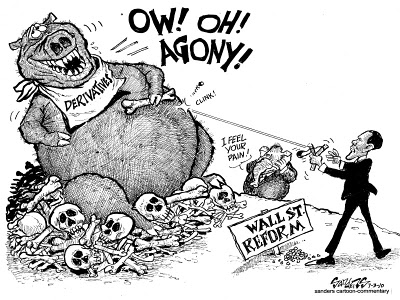
This, of course, has always been true of capitalism. Fernand Braudel had argued that contrary to prevailing myths, capitalism is anti-market. The market economy, the world of transparent visible realities on which ‘economic science’ was founded, he contended was ‘the not unacceptable face of ‘micro-capitalism,’ barely distinguishable fro ordinary work,” it was very different from the rarefied heights from where exceptional profits–as cornered by the derivatives traders and financiers–are reaped.
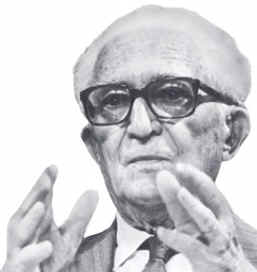
It is precisely because derivatives are ‘exotic’ instruments and not understood by the public, that the virtual identity between free markets and capitalism incessantly proclaimed by policymakers, economists, and journalists live on in the public domain. In many transactions at the corner grocery store or a farmers’ market, there is an appearance of free markets–of small producers and shop keepers selling goods to the public, “barely distinguishable from ordinary work.” But even here, the principles of the market do not operate. No seller in a farmer’s market can know the costs of production of their competitors and nor could consumers go to every seller even in a nearby area to compare prices–in most cases, sellers quote prices they think they can get away with and consumers pay what they think they can afford.
Derivatives trade, of course, is very different. They are designed to shift risks. Typically, if the price of a gallon of oil is $2.50, large consumers may choose to lock in future supplies at $2,80 a gallon so that if prices soar to $3.00 or $3.50 a gallon, they will be insulated from the rise. Their suppliers have no idea how much lower they could charge their customers because the banks dont disclose the process by which prices are set. This is where the collusion takes place–and where the big profits are reaped.
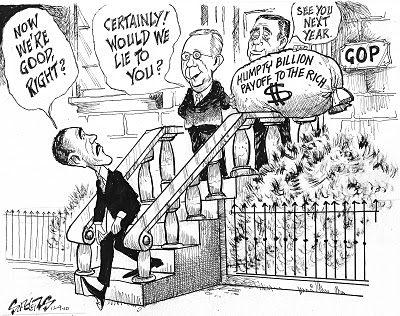
If this is not enough, we also learn that as the financial crisis set in 2008, the US Federal Reserve opened its vaults a staggering 174 times within a 13-month period to the Citigroup, that Barclays, the British Bank owed the Fed some $48 billion at one time and on and on the list goes of the US Central Bank massively shoring up domestic and foreign banks and even to corporations such as Harley Davidson and McDonalds without public scrutiny. Needless to say, no such facility was ever considered for smaller operators. So much for free markets without the distorting influence of the state!
Create a free website or blog at WordPress.com.
Entries and comments feeds.

